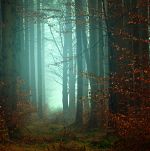What to do when you feel lost
When I think about what I do for a living, it is largely this: I sit with people who are lost. I reassure them that it is okay to be lost, that it is a good place from which to discover new things, to find new paths. That it may feel confusing and frightening now, but it will ultimately set them free to begin a whole new journey.
Most don’t believe me at first. Sometimes I question it myself.
Being lost is rarely pleasant. Initially at least, it can feel hopeless and terrifying, particularly in the dizzying moment of realisation that we don’t know who or where we are. The poet Dante Alighieri wrote in 1308, “In the middle of the journey of our life, I came to a dark wood where the straight way was lost.” [1] For him it was a kind of death of the self. “So bitter is it, death is little more.”
Being lost for the poet John Keats was a place of profound creativity. It is where we are closest to the mysteries of life. We should not flee, but rest and notice. He called it Negative Capability – “that is, when a man is capable of being in uncertainties, mysteries, doubts, without any irritable reaching after fact and reason.”(Keats, 1817).
Poets and artists seem to require this feeling of not knowing as they begin their work. Isn’t that what the blank page is after all, the ultimate place of uncertainty? And isn’t our life our own work of art, an act of creation as we grapple with, survive and try to understand, to transform whatever challenges are thrown at us?
Being lost, once you get beyond the fear and frustration (which is where psychotherapy is useful) is pregnant with possibility.
When we are lost, we often don’t know how we ended up here. There may be external reasons for it, things that happened to make us shut down and afraid. We may have sleepwalked through our lives, doing a job or being with a partner we don’t like, or closed ourselves off from the world or ourselves. As Dante wrote:
“I cannot well repeat how there I entered,
So full was I of slumber at the moment
In which I had abandoned the true way.”
We may not believe we have the tools to create the life we want.
We might not even know what we want or even who we are.
“How will you go about finding that thing the nature of which is totally unknown to you?” asks the essayist Rebecca Solnit in A Field Guide to Getting Lost.
Solnit explores moments of not knowing - from not knowing our ancestry, where we come from, to not knowing where we are going. She talks about the colour blue which, due to atmospheric perspective and scattering, is the colour of distant hills, the halo around the earth when seen from space, the blue at the edge of the horizon, the sky, the ocean. This dreamy distant blue represents the places we never reach; and if we do, they are no longer imbued with this mysterious colour. In which case, she says, we need to recognise that the longing itself has a kind of beauty. If only we could “own the beauty of that blue that can never be possessed.” [2]
When I first meet a new client, they are a new, unknown world. We discover together how it is they came to thisplace of feeling lost, of losing their sense of self, and what they want from their “one wild and precious life”.[3]
Towards the end of therapy, the client and I emerge from the psychological dark woods into a kind of light orclarity. But the journey to that moment is full of mystery and revelation, every step worth paying attention to, every difficulty worked through. When theclient discovers their own blue of longing and begins that new journey forward, they no longer need me.
As a companion to the lost, I know what being losing my own way feels like. I have felt the often fear of uncertainty, the confusion of not knowing who I am or where I want to be. Sometimes I make the mistake of trying to escape the feeling, distracting myself with new projects or goals I don’t really care enough about.
But I have also learned to recognise the signs. Once I have worked out that I am lost, there are a few things I do.
First, to borrow from Douglas Adams’ Hitchhiker’s Guide to the Galaxy, DON’T PANIC.
Then, slow down.
Make time each day, if possible, to sit in this space of not knowing and see what arises; practice the art of middle-distancing; read; write pages of rambling stream-of-consciousness, poetry, dreams, anything; doodle; make time to look at nature and art – I mean really look; find places to people-watch; have deep conversations; be honest but also kind; consciously choose to procrastinate and achieve nothing; trust that deep down you will know it when you see it (whatever ‘it’ is). Let yourself daydream. Play. Own the beauty of the blue.
[1] Dante Alighieri, The Divine Comedy
[2] Rebecca Solnit, A Field Guide to Getting Lost
[3] Mary Oliver, The Summer Day.



